A Transdisciplinary Perspective in Academia
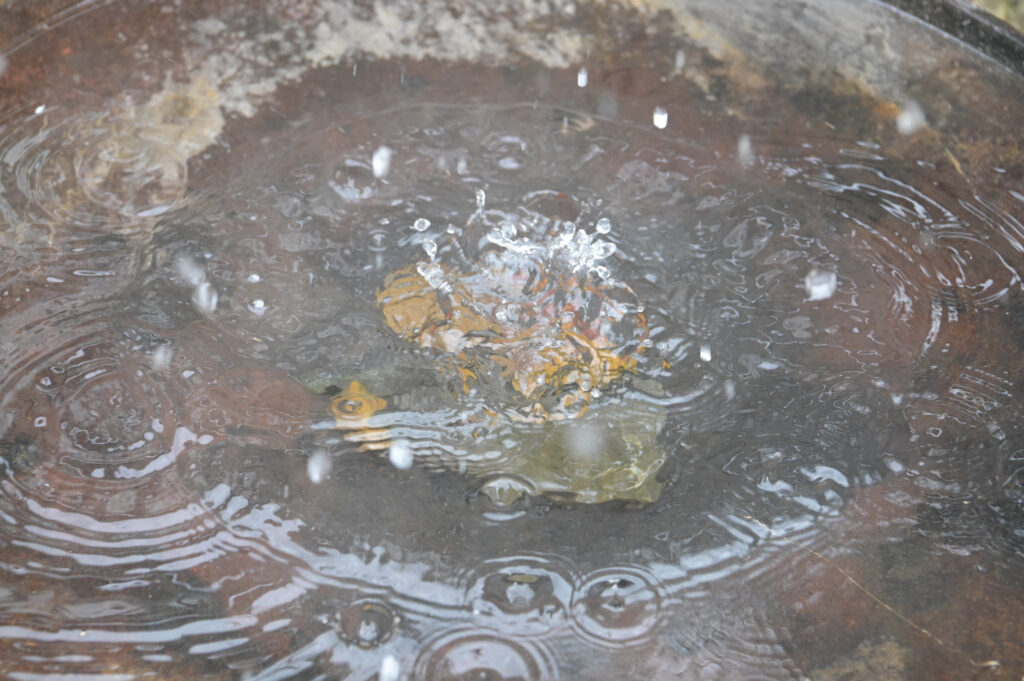
Image credit: Floris Dekker / Claveles
Read the January 2025 interview with the Impact team here!
We interviewed each other and published them as podcasts too! See the bottom!
Introduction
In contemporary academia, the notion of “impact” has become ubiquitous, yet its overuse has rendered it a buzzword in need of critical examination and action. The prevalent reliance on metrics, benchmarking, and indexing systems has perpetuated institutional and disciplinary hierarchies, often resulting in superficial assessments lacking systemic understanding. This project seeks to dissect these issues and foster a critical reflection on impact assessment within academia. Our goal is to facilitate a transition towards regenerative practices that acknowledge the interconnectedness of research, education, and public engagement.
Researchers and educators grapple with the dilemma of individual versus collective impact assessment, further complicated by varying interpretations across disciplines. Despite best intentions, the broader implications of our work often go unnoticed, particularly within inter- and transdisciplinary contexts.
Our project aims to unravel these complexities by fostering a dialogue on reconceptualizing impact beyond disciplinary confines. We advocate for an unconventional collaboration, departing from traditional approaches and embracing a transdisciplinary perspective. By integrating embodied experiences, art, connection with nature’s wisdom, and diverse ways of knowing, we seek to unearth insights overlooked by conventional methods.
Embarking on a transdisciplinary research journey brought together a dynamic blend of different cultural backgrounds and academic expertise. Hailing from the Netherlands, Hong Kong, Italy, and Poland, our team comprises Peter, a Physicist studying complex, nonlinear systems in particular fluid dynamics; Petra, a Cell Biologist delving into the science of lab grown organs, more specific human penises; Emanuele, a political scientist exploring the cultural and political significance of rivers through collaborations with journalists and artists; and Ewelina, an Industrial Designer with a penchant for ecosystemic approach to design practices and radical sharing of aliveness. This diverse team, with members open to observing and learning through a mix of academic and non-academic methods, ignites a unique yet significant spark in exploring ways to rethink impact.
Research team: Peter Dung (TU/e), Emanuele Fantini (UU/TUD), Petra de Graaf (UMCU), Ewelina Schraven (TU/e).
Contact team: p.degraaf-4 [at] umcutrecht.nl.
Process
Thanks to the facilitation by CUCo process coach Neža Krek, we decided to divide our exploration journey into four sessions, each organized by one of us. Each session employed a different medium for us to explore the theme of “rethink impact”: narrative, art, warm-data photography, and podcast (see below for each session). The picture below displays the journey that we plan to go through.
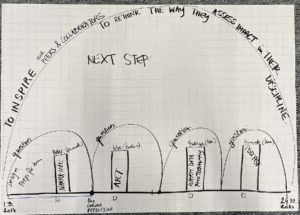
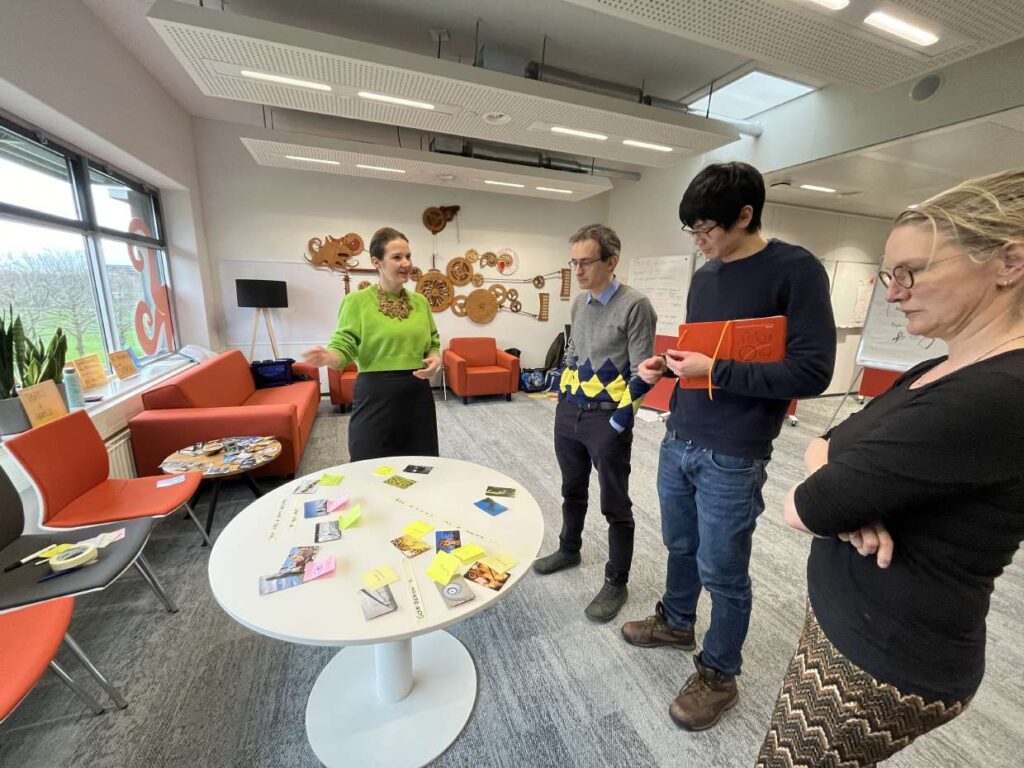
Narrative
This is our first session among the four. We spent a full day on in May 2024 crafting our own stories and attempting to co-create a story together. We invited Ingi Mehus, the founder of Pocket Stories, to guide us through the whole process. Before attending this session, each of us did our homework to reflect on our own lives and turning points by drawing them out on a large sheet of white paper without using any words.
To craft impactful stories, we learned to know our audience, draft a clear message, and connect the stories with our personal lives. Each of us took turns telling our own crafted stories while the others drew what we heard (see below). Petra told a story to connect with patients with urinary problems via a visual. Ewelina told a story to unleash the power of a life-centered mindset. Peter told a story of connecting disciplines and how technical scientists can contribute differently by reaching out and collaborating with non-technical disciplines. Emanuele told a story about his work with his students and his impact beyond publishing papers. Through active listening and giving each other feedbacks and thoughts, we can harness each other unique disciplinary and cultural background and perspective to improve our story and “rethink impact”.
Finally, we drafted a co-created story with a target audience of our colleagues and the tentative message: “Be brave or perish.”
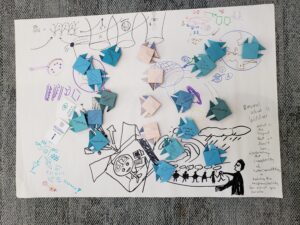
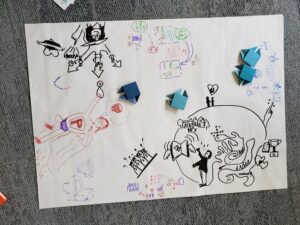
Figure: the drawings created as we listened to each other’s stories.
Art (Visual storytelling)
In this second session on one day in June 2024, we learned how impactful visual stories can be made and told our crafted stories with visuals. This time, we invited Anaïs Lopez, a visual artist and storyteller known as Missie Lopez, to show us how she created impactful visual stories. We were inspired and amazed by how stories can be beautifully told with visual art. We learned to first come up with a personal message and then try to expand it into a more universal one. Moreover, stories and impact do not need to be created alone. We can identify the missing parts needed and find the people who can help us craft such (visual) stories and create an impact. This time, with our crafted stories from the narrative sessions, we additionally used pictures to tell our stories (see below for an example from Petra). In the end, we gave each other feedback and thoughts from our own perspectives on each other’s stories. Emanuele this time created a visual story about his work on the relationship between water and humans, with the target audience being photographers he wants to inspire to collaborate on this project. Moreover, thanks to the feedback from the others, Peter connected his story with his cultural background and drew from the idea of “the unity of Heaven (nature) and Humanity” to stress the connections between people and nature.
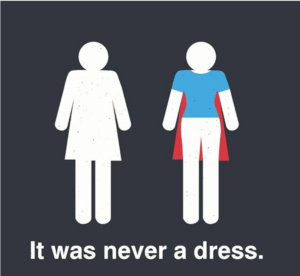
Figure from the #itwasneveradress campaign
Warm-data photography
On one day in July, we focused on our relationship with nature, the connection between nature and art, science, and technology—all in a two-day meeting. We explored our connections to nature with Louis Bijl de Vroe, visited the Kröller-Müller Museum, and stayed overnight, having a campfire meeting with our project coach, Neža Krek. From Louis, we learned the need to ground ourselves from time to time and his idea of the “periodicity” of systems around us. During our “grounding with nature” activity, each of us went to a spot alone in the national park for 2 hours without any phone connections. Afterward, we discussed freely, and several ideas emerged, including how to create “resonance” with others, “the creation of cultural islands,” “the importance of maintaining balance,” and how our act of coming together already creates an impact by supporting each other. At the end of the day, we wrote down all the important steps each of us had gone through from the start of or before this CUCo exploration journey to reflect, converge, and then determine the next steps.
The next morning, we explored the wisdom of the herd with tussen Hemel en Paarden. Horse coaching can be a way of learning leadership and reflecting on ourselves since interacting with horses can be a “mirroring” activity. For horses, it is important to find a safe place, and to lead a horse, we need to show our “energy” to the horses correctly.
Last but not least, while being “serious” about our CUCo project, we enjoyed and let ourselves “flow” with the activities, harnessing the “playfulness” to extract ideas and reflect. Starting from the ground state (grounding with nature) at the beginning, we reached an excited state because the process itself found the right way to “resonate” with us.
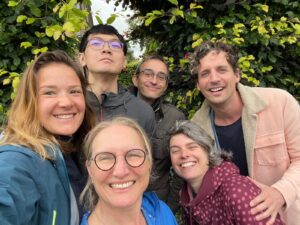
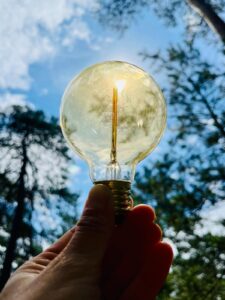
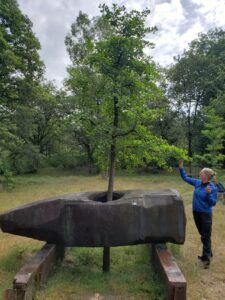
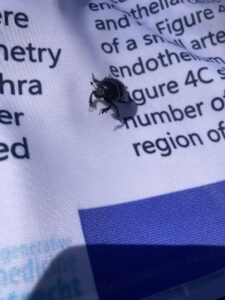
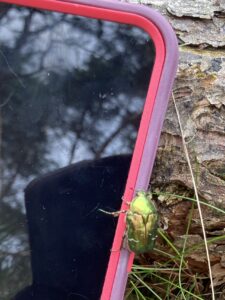
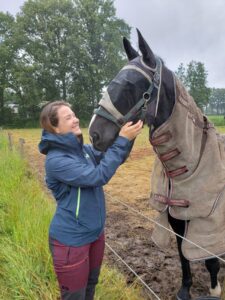
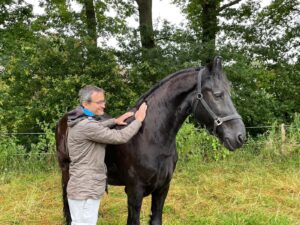
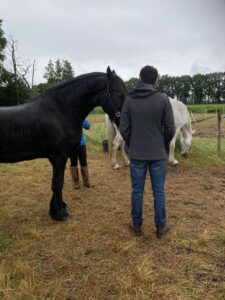
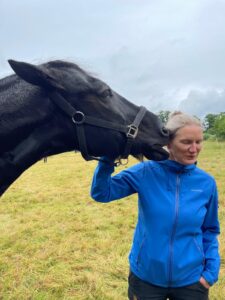
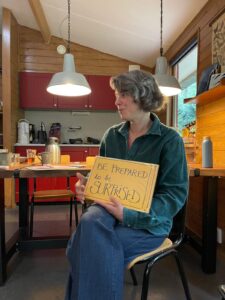
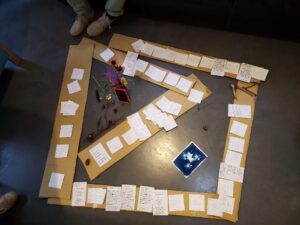
Pictures taken during the warm-data photography session.
Podcast day (see the bottom for the podcasts)
This session was led by Emanuele in sep 2024. We learnt what we should be aware of and practice a bit before making the podcast thanks to Emanuele. We interviewed each other as PEPE (Petra, Emanuele, Peter and Ewelina). We reflected about our IMPAct journey: what did we learn about our impact from our IMPAct journey together? How do we conceive our own impact? Curious about it? Listen to our podcast (see the bottom)!
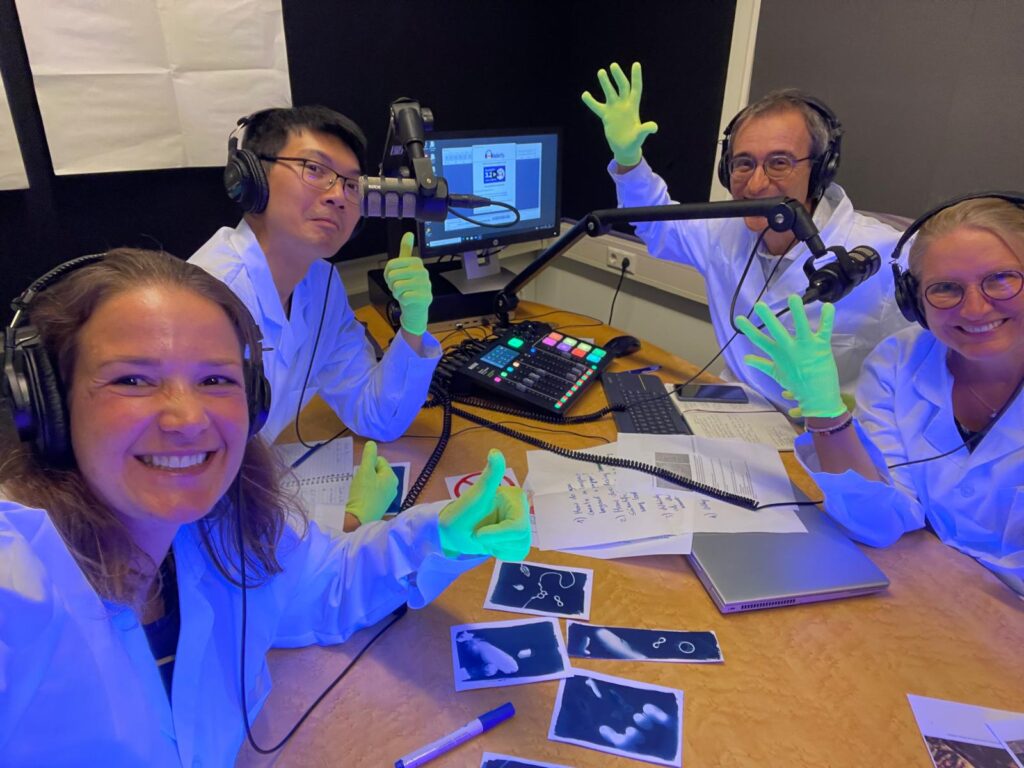
Betweter festival (Art-Science festival)
We hold an “experiment” at the Betweter festival on 27 sep 2024 (see here for a tiny description). This experiment was led by Ewelina and she prepared basically 90% of it (thanks!)! We had great conversations with the participants and we asked mainly the first two questions “what would YOU like Science to help you with?” and “how would it change YOUR life?” in order to make it more specific, rather than solving climate change. The last question is “how would you know / notice?”. We got many interesting response, ranging from traffic jam to very specific ones!

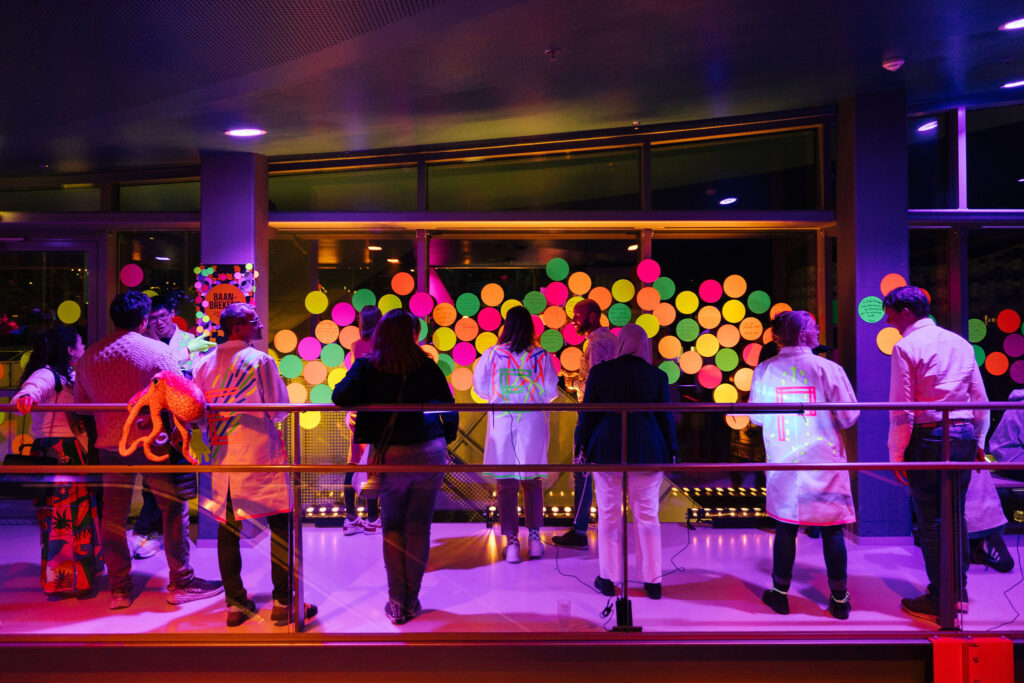
Photo credit: Ward Mevis
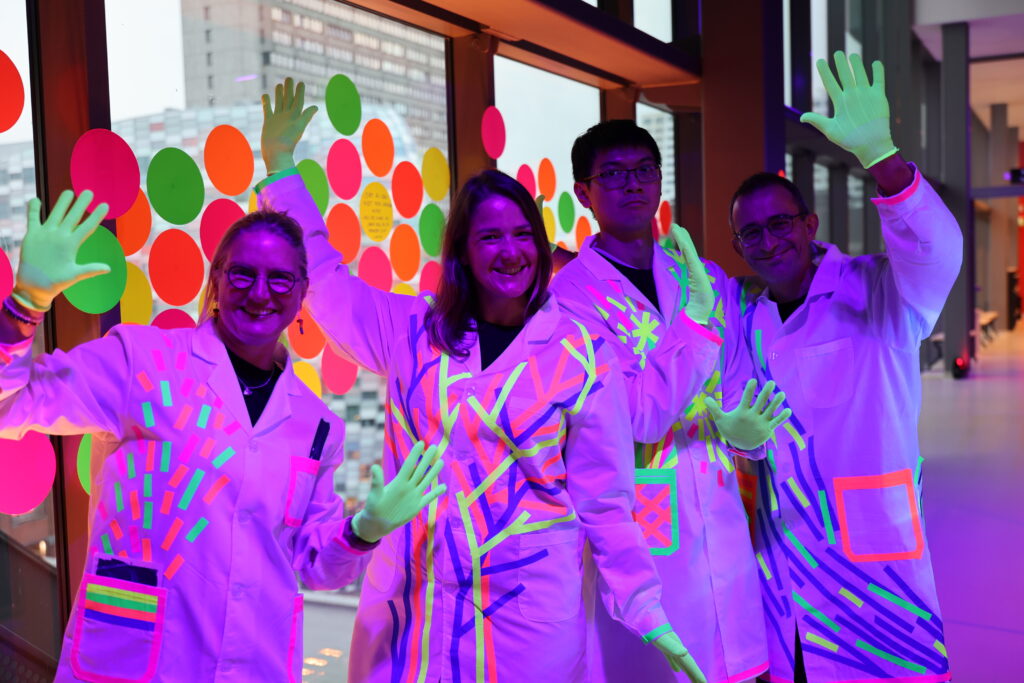
Photo credit: Lucas Keijning
International Transdisciplinary (ITD) conference 2024
The conference is held on 23 Oct 2024. Our submitted talk title is “How to assess academic impact from an interdisciplinary perspective“. The abstract can be found here. It was held at the Railway Museum in Utrecht! We enjoyed a lot of different ITD talks there. We employed an “unusual” approach to present our work. Each of us talk about one theme that we learnt and thought about our own impact from our Spark journey by using only pictures.
Petra (P) talked about “embodiment” and what she learnt about other meanings of “regenerative” beyond her own profession on regenerative medicine, such as with nature and more empathy with others. She also learnt about the theory of U on conversations.
Emanuele (E) talked about “relations“. He has been facilitating relations among different professions related to “water” (Nile river). He also shared what he learnt from his interaction with horses: the importance of being present and focused to care for relations.
Peter (P) talked about “storytelling“. He mentioned even natural scientists need to know how to tell a story effectively on their own work in order to publish high quality journals. He benefited from interacting with artists and storytelling experts on this. He also gave advice to others that go reach out other disciplines if you are interested in them. One can explore how to leverage one’s own discipline on looking at another problem.
Ewelina (E) talked about “movement“. From this CUCo journey, she learnt about creating a movement. From the Betweter festival, we drew many insights and conversations about taking a different perspective on the impact of science we had about. IMPAct is not about publications, but how does your work influence you, your practice, the culture, and life. To change the culture in science, we need to be brave to stand up for what you believe in, talk about it with others, listen to them. One person may not change the world- we do it together (creating “cultural islands”). Find the people, who resonate with that, and create a movement. Moving from EGO TO ECO.
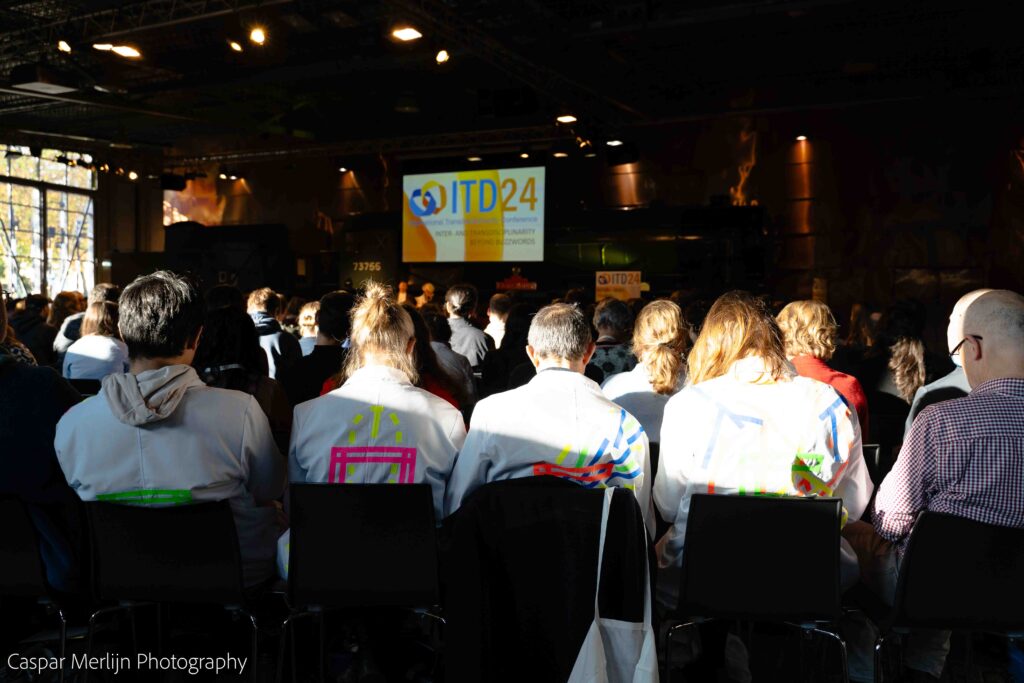
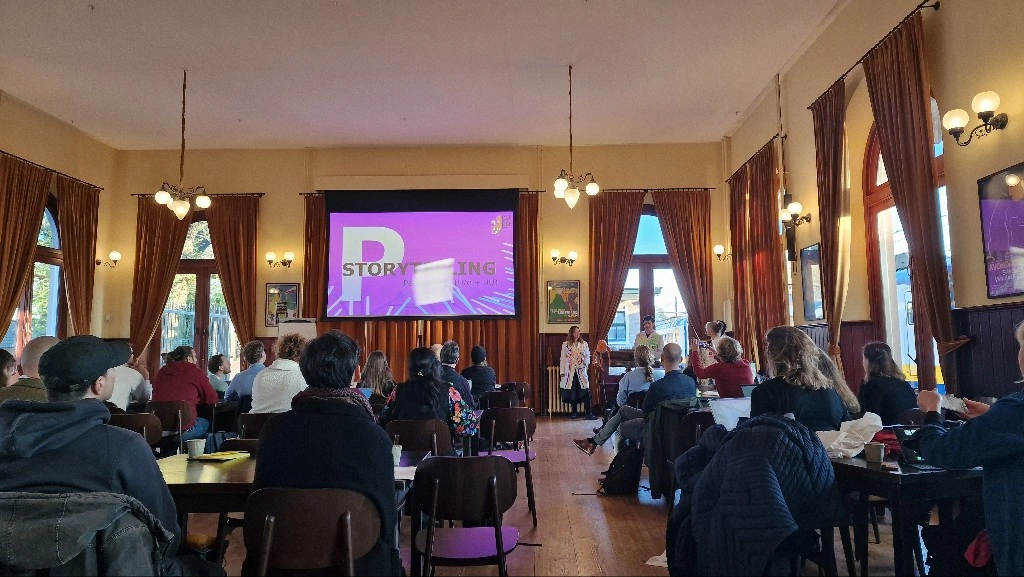
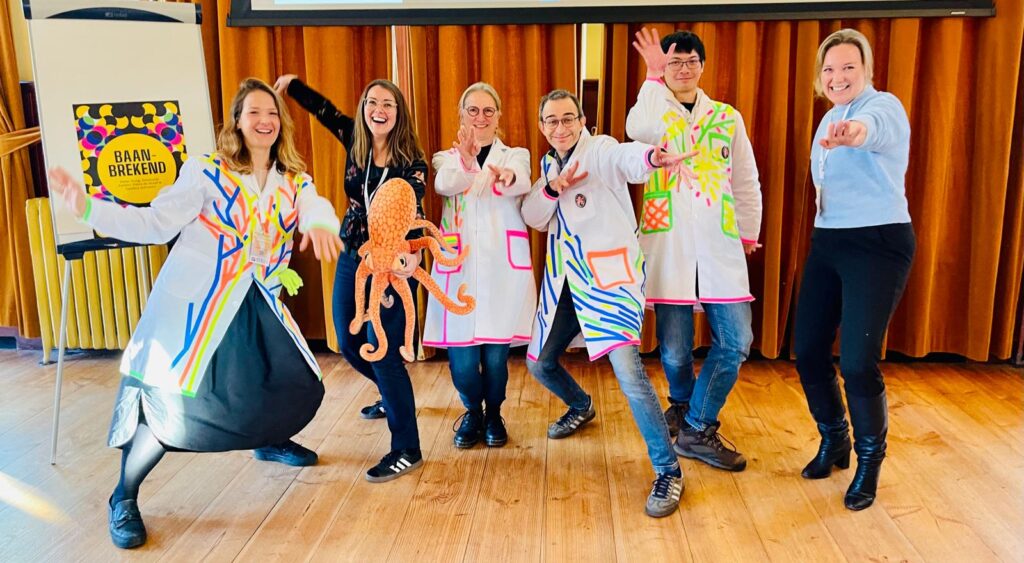
Podcasts
We interviewed each other as PEPE (Petra, Emanuele, Peter and Ewelina). We reflected about our IMPAct journey from an inter/transdisciplinary angle: e.g. what did we learn about our impact from our IMPAct journey together? How do we conceive our own impact?